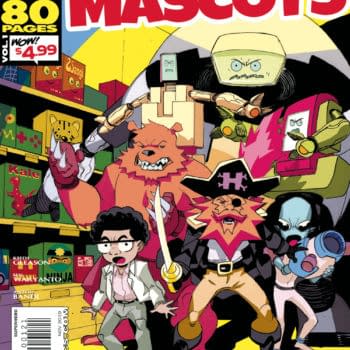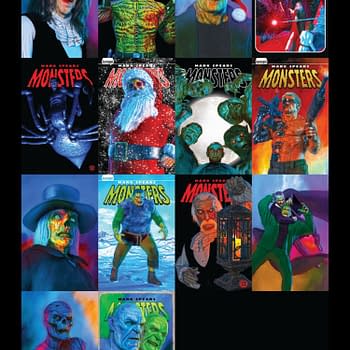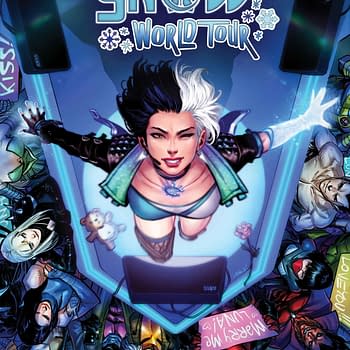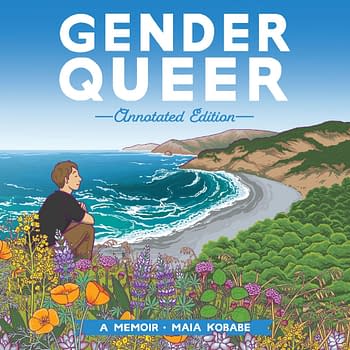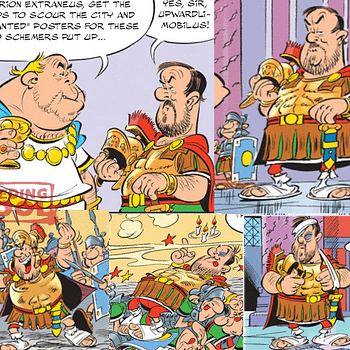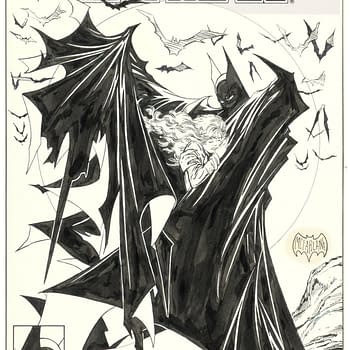Posted in: Comics, Recent Updates | Tagged: ka, set, the tempest, Vera Greentea
Review: Papa by Vera Greentea, Joseph Lacroix, Lizzy John, Ben Jelter and Adam Wollett
On this side of the Atlantic, the stereotypical view of fathers is easy; Deep Purple and AC/DC CDs, Top Gear paraphernalia, John Le Carre novels (None of which is a bad thing) and sheds (Which, provided they're spider free are also no bad thing). The reality is of course infinitely more complex and nuanced but being from the UK we don't tend to talk about it. Or do anything about it. Or have feelings.
Greentea Publishing on the other hand, have a very different view of fathers, one that's showcased in the upcoming anthology comic, Papa. Papa is a three story anthology, written by Vera Greentea with art by Joseph Lacroix (Diablo), Lizzy John (Dark Crystal) and Ben Jelter (Sidius Nova). I was lucky enough to get a preview copy and really liked it. Here's why.
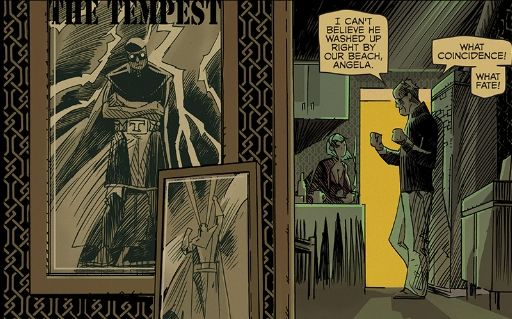
'Papa', the title story illustrated by Joseph Lacroix, follows a young boy as he sees a superhero fall into the ocean outside his house. The only person more excited than him is his father Mortimer, who has been writing the definitive book on The Tempest, the hero on the beach, for the last three years. His wife is horrified by how pleased he is about the death and how little he cares about his son's trauma but he's only concerned with finishing the book and cementing his legacy. As, it seems, is The Tempest.
This is a fantastic and very dark take on two different types of hero worship. Mortimer Sr is so swept up in his love for The Tempest that he can't see the life he's built up for anything other than a support structure. He's an academic, a man who has carried a passionate affair with an idea on for years and when that idea is delivered to him, it's all he can see. Mortimer Sr is infinitely less mature than his son and hasn't got the capacity to even notice that until it's far too late. You get a wealth of information about how he relates to his family in just a few pages, all communicated with subtle nuances of language and posture. Together they show you a lifetime of compromise, of two people fitting into the few parts of their lives not filled by Mortimer Sr, his ambition and his charisma.
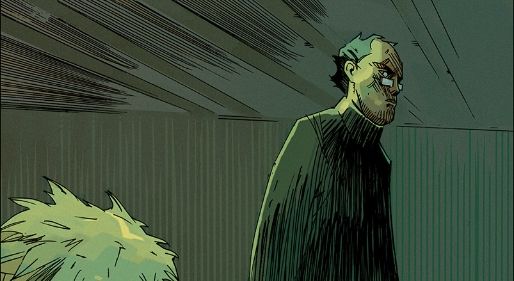
Mort Jr's hero worship takes two very different paths. The first is the careful way he manoeuvres around his father. This is the best writing in the book, Greentea perfectly capturing that combination of caution and baiting that children can't help but do with the house authority figure. The second is his attitude towards The Tempest, which is innocent, sweet and provides the story with a final page that's either horrific, hopeful or both. Mort Jr has no space in his home because it's all taken up by his father's ego. He finds that space in his attitude towards The Tempest, one of the most aptly named superhumans in years. He causes seismic change in all the characters and leaves them, and you, on the verge of something massive. Like Mort, and perhaps, Mortimore Sr, you get to decide what that is.
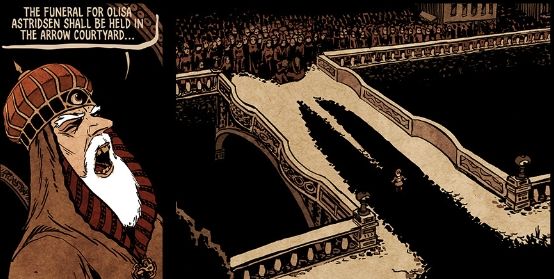
The Princess and the Robot follows, with art by Ben Jelter and letters by Adam Wollett. Where Papa is a fragile, personal story this is both epic in scope and different in tone. There's a hint of Arrakis to Jelter's sand-blasted, red washed architecture and that's carried through into some really nice design work. Where Papa is the story of a family orbiting one man's obsession, this starts out as the story of a country at war making one last gambit. A monstrous bio-robot from the neighboring kingdom of Ka is parked on the border and if it isn't fed children will march into the country and destroy it. When word comes that peasant children are no longer good enough and the king has a fortnight to feed his daughter to the machine, he has no choice. His daughter will be made into a weapon to destroy the robot and end the war forever. But will she still be his daughter?
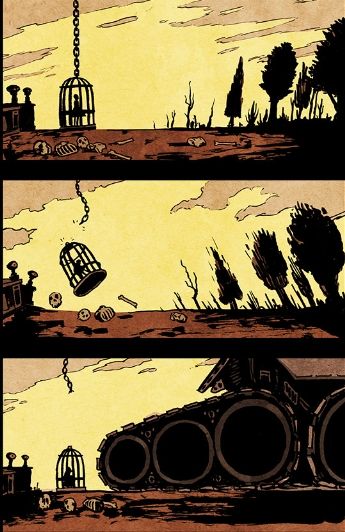
Jelter's design work is wonderful here and gives the characters a slightly Gilliam-esque edge that emphasizes their fragility. He also excels at the monstrous, and the monolithic robot of Ka, as well as what the princess becomes to fight it are both memorably horrible. What really works here though is the way that Greentea explores the damage done by parents through the weaponized Princess. Her actions are heroic but they're shaped, as is she, by the needs and choices of her father. A lesser writer would have been content to stick there and coast to the end on the horror of using a little girl as a weapon of war. Greentea brings nuance and implication to the table instead, as we get an idea not only of how little control the King has but how much he's aware of that fact. The story closes with another moment of both hope and horror and makes it clear that the scars the Princess and the King both carry will be with them for a long time.

Nightbirds closes the book out. The art by Lizzy John is amazing, combining rich, lush otherworldly colours with a battered pulp design aesthetic. Set on Earth after an apocalyptic event, it opens with Set and Mil, two scientists searching the sky for something. Night's falling and as the pair begin to head down, they're attacked by a Nightbird. The Nightbirds are one of the only creatures left, huge, human-sized birds that pose a threat to anyone outside. Set is desperate to continue his research, convinced it's the only thing that will save the people left whilst his wife, Yova, is completely focused on caring for their dying daughter Annabelle. The situation is made even more complex by the fact that Yova, a medical geneticist is powerless to stop the death of her daughter let alone her species, whilst Set, a theological astronomer, is convinced the solution lies in his work.
This is the most ambitious of the three stories by a mile, taking in spirituality, the end of the world, mortality and something that bears a close resemblance to the Mothman all at once. Again, Greentea's depiction of a driven, overly focused intellectual father is extremely well done but here it's in formation with her first real depiction of a mother. Yova is every inch Set's equal, and carries the pain he refuses to. It's no accident that Set's work takes him to the skies whilst Yova is perpetually underground; one is obsessed with an ethereal, barely coherent idea whilst the other is trying to keep herself alive long enough to make her daughter's final days comfortable. The conflict between the two feels entrenched and real and the awkward moments where Mil is at the table to hear them argue are especially well done.
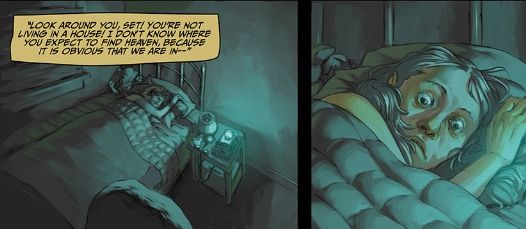
The one fault the story has is it tries to do too much. The sheer weight of information about the world leads to a couple of overly wordy speeches and, if anything, it could have taken another couple of pages to spread that out and give it a little breathing room. That being said, the ending is fantastic, hitting similar beats to the ending of Papa but in a drastically different way. Both are concerned with the incredible tranquility that can be found in ideas but where the ending of Papa implies a price paid by family, the ending of Nightbirds implies that the price is paid by the father. Read this story again when you're done and the whole idea of the Nightbirds will feel very different, I'm sure.
Papa is a striking, assured set of stories about fathers. Each story is emotionally complex but completely accessible and the carefully chosen artists bring out the best in each script. This is clear-eyed, perceptive comics at their best, using superheroes, bio-robots and wing packs to tell stories that have something in them almost everyone will recognize. This was my first exposure to Greentea's writing. It won't be my last.
Papa is released on July 2nd and is available for $10.00 plus shipping from Greentea Publishing now.


